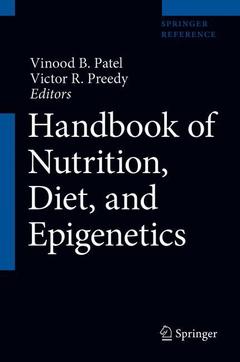Description
Handbook of Nutrition, Diet, and Epigenetics, 1st ed. 2019
Coordinators: Patel Vinood B., Preedy Victor R.
Language: English
Subjects for Handbook of Nutrition, Diet, and Epigenetics:
Keywords
Modulating epigenetics with diet and nutrition; epigenetcs of cardiovascular system; epigenetic processes of diet and nutrition; epigenetics and disease; epigenetics and minerals; epigenetics and nutritional toxicology; epigenetics and vitamins; epigenetics of DNA repair; epigenetics of caloric and dietary restriction; epigenetics of cancer; epigenetics of development and ageing; epigenetics of metabolic syndrome and obesity; epigenetics of musculoskeletal system; epigenetics of nutirtion and diet; epigenetics of organs; modifications of DNA via methylation; modifications of histones; modifications of non-coding RNAs; nutritional health; protein-encoding genes
2338 p. · 15.5x23.5 cm · Hardback
Description
/li>Contents
/li>Biography
/li>Comment
/li>
This multivolume reference work addresses the fact that the well being of humankind is predicated not only on individuals receiving adequate nutrition but also on their genetic makeup. The work includes more than 100 chapters organized in the following major sections: Introduction and Overview; Epigenetics of Organs and Diseases in Relation to Diet and Nutrition; Detailed Processes in Epigenetics of Diet and Nutrition; Modulating Epigenetics with Diet and Nutrition; and Practical Techniques. While it is well known that genes may encode proteins responsible for structural and dynamic components, there is an increasing body of evidence to suggest that nutrition itself may alter the way in which genes are expressed via the process of epigenetics. This is where chemically imposed alteration in the DNA sequence occurs or where the functional expression of DNA is modulated. This may include changes in DNA methylation, non-coding RNA, chromatin, histone acetylation or methylation, and genomic imprinting. Knowledge regarding the number of dietary components that impact on epigenetic processes is increasing almost daily. Marshalling all the information on the complex relationships between diet, nutrition, and epigenetic processes is somewhat difficult due to the wide myriad of material. It is for this reason that the present work has been compiled.
Nervous system.- Development and ageing.- Cancers.- Caloric and dietary restriction.- Detailed processes in epigenetics of diet and nutrition.-Modifications of DNA via methylation.- Modifications of histones.- Modifications of non-coding RNAs.- DNA repair.- Modulating epigenetics with diet and nutrition.- General treatments and strategies.- Vitamins.- Minerals.- Specific foods and nutrients.- Nutritional toxicology.- Practical techniques.
Victor R. Preedy (B.Sc., Ph.D., D.Sc., FRSB, FRSPH, FRCPath, FRSC) is a senior member of King’s College London, where he is also Director of the Genomics Centre and a member of the Faculty of Life Sciences and Medicine. Professor Preedy graduated in 1974 with an Honors Degree in Biology and Physiology with Pharmacology. He gained his University of London Ph.D. in
1981. In 1992, he received his Membership of the Royal College of Pathologists, and in 1993 he gained his second doctoral degree for his outstanding contribution to protein metabolism in health and disease. Professor Preedy was elected as Fellow to the Institute of Biology in 1995 and to the Royal College of Pathologists in 2000. Since then, he has been elected as Fellow to the Royal Society for the Promotion of Health (2004) and the Royal Institute of Public Health (2004). In 2009, Professor Preedy became Fellow of the Royal Society for Public Health and, in 2012, Fellowof the Royal Society of Chemistry. In his career, Professor Preedy has carried out research at the National Heart Hospital (part of Imperial College London), the School of Pharmacy (now part of University College London), and the MRC Centre at Northwick Park Hospital. He has collaborated with research groups in Finland, Japan, Australia, the USA, and Germany. He is a leading expert in the science of health and has a long-standing interest in food and nutrition for over 30 years,
especially related to tissue pathology and cellular and molecular biology. He has lectured nationally and internationally. To his credit, Professor Preedy has published over 600 articles, which include peer-reviewed manuscripts based on original research, abstracts and symposium presentations, reviews, and numerous books and volumes.
Vinood B. Patel (B.Sc., Ph.D., FRSC) is a Reader in Clinical Biochemistry at the University of Westminster and honorary Fellow at King’s College London. Dr. Patel graduated from 1992 the Un
Addresses emerging and established fields of epigenetics in connection with diet and nutrition
Expands the knowledge base and maps out key areas for research
Contributors are authors of international and national standing
Each chapter contains an abstract, summary, key facts, and glossary
Includes supplementary material: sn.pub/extras
These books may interest you

Nutrition and Epigenetics 56.31 €

Nutrition and Epigenetics 220.72 €

Epigenetic Epidemiology 158.24 €

